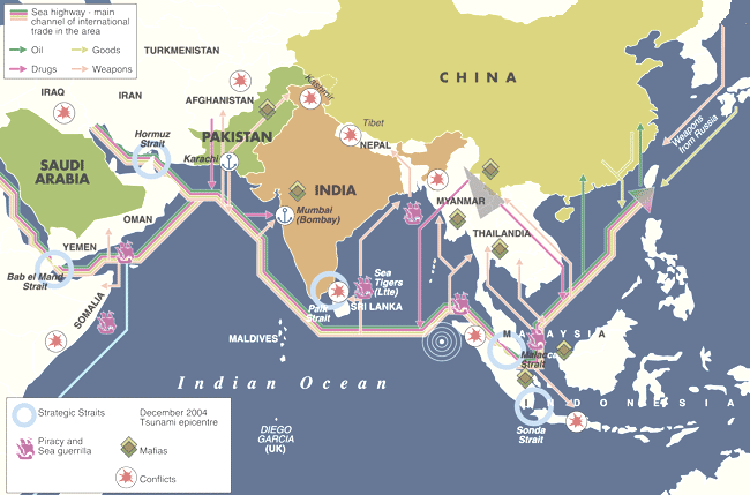|
INTERNATIONAL FRAME
&
Tamil Struggle for Freedom: Japan |
|
 |
|
Japan until 2004 was the second
largest importer of oil in the world. It was then overtaken by China.
The United States is the largest importer.
" The Indian Ocean is a critical
waterway for global trade and commerce. This strategic expanse
hosts heavy international maritime traffic that includes half of
the world’s containerized cargo, one third of its bulk cargo
and two third of its oil shipment. Its waters carry
heavy traffic of petroleum and petroleum products from the oilfields
of the Persian Gulf and Indonesia, and contain an estimated 40%
of the world's offshore oil production... The Ocean features
four critically important access waterways facilitating
international maritime trade - the Suez Canal in Egypt,
Bab-el-Mandeb (bordering Djibouti and Yemen),
Straits of Hormuz (bordering Iran and Oman), and
Straits of Malacca (bordering Indonesia and Malaysia). These
“chokepoints” or narrow channels are critical to world oil trade
as huge amounts of oil pass through them. "
The Indian Ocean Region: A Story Told with Pictures
|
|
Japan's aid not conducive to
peace in Sri Lanka - Tamil National Alliance, 2 July 2007 |
|
Japan has no immediate plans to follow lead of other donor countries and
freeze aid to Sri Lanka, 10 June 2007 |
|
Japan, which provides over 60% of Sri Lanka’s foreign aid, has no
plans to cut its support, 26 May 2007 |
|
Japanese envoy Mr.Yasushi Akashi meets Head of the Political Wing of the
Liberation Tigers of Tamil Eelam (LTTE) S.P. Thamilchelvan in
Kilinochchi, 14 May 2005 |
|
Japan to provide $240m loan to Sri Lanka, 5 November 2004 |
|
"ISGA the base for future peace talks"
- Akashi, 19 May 2004 |
|
Japan reiterates continued support for peace process, 5 December 2003 |
|
Japanese envoy Mr.Yasushi Akashi
meets Pirapaharan, 8 May
2003 |
|
LTTE to boycott Japan aid conference
in June , 12 April 2003 |
|
Japan's
Cheque Book Diplomacy - Nadesan Satyendra, 15 May 1992 |